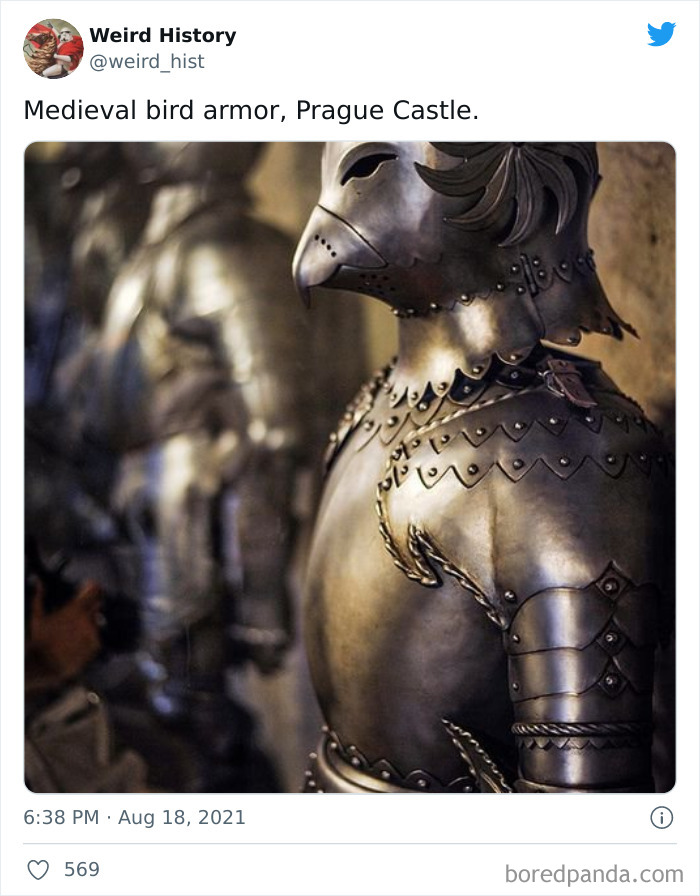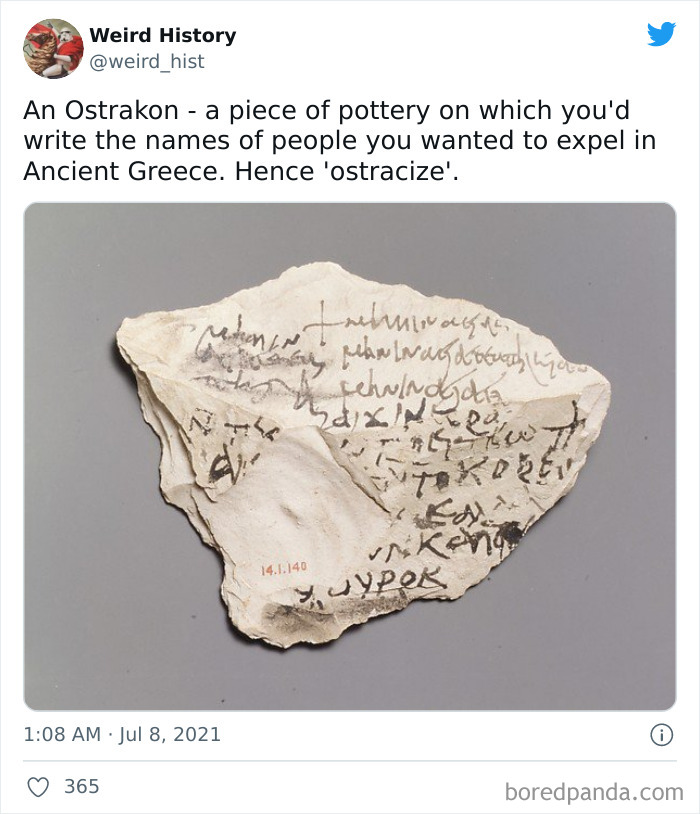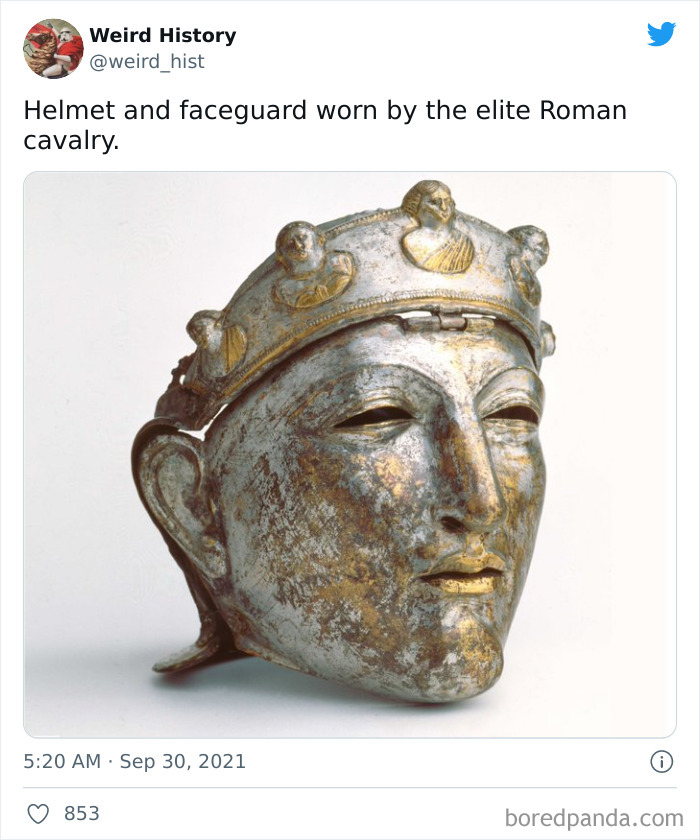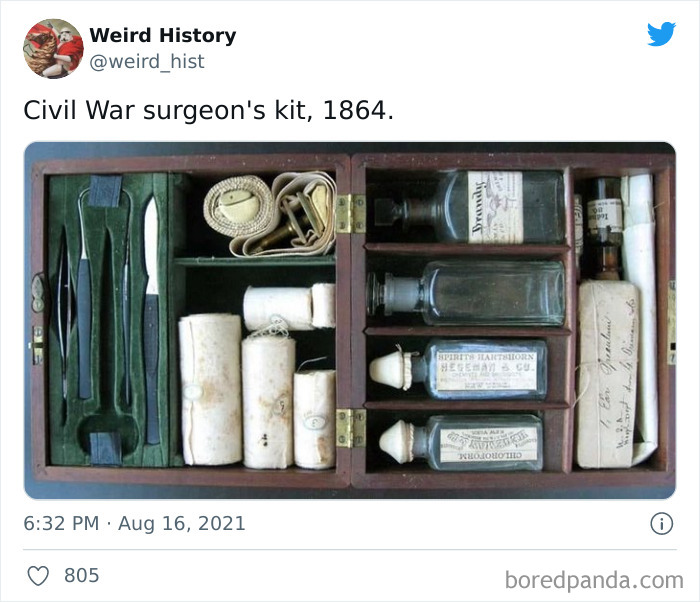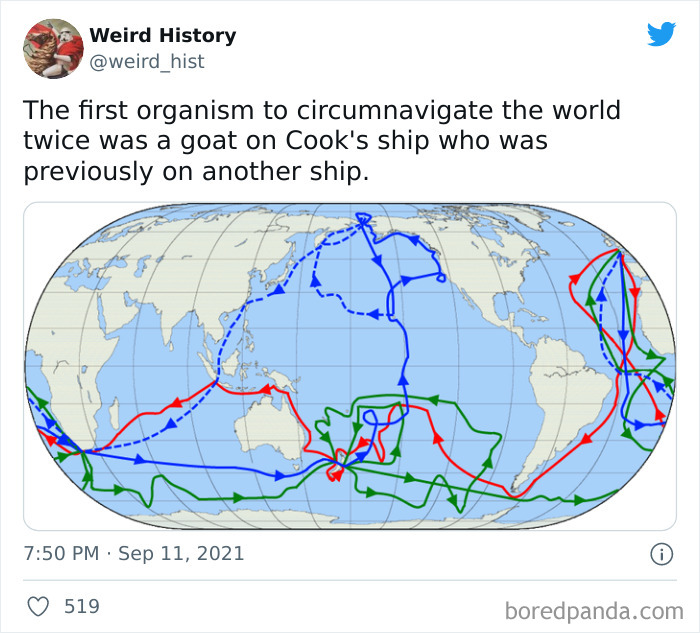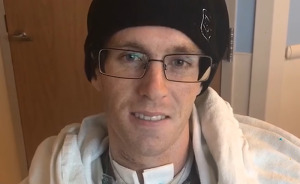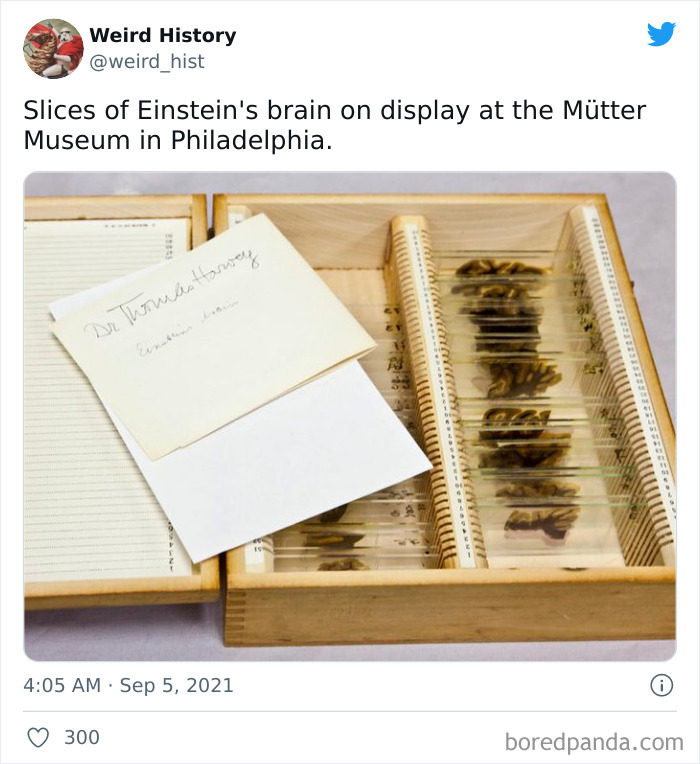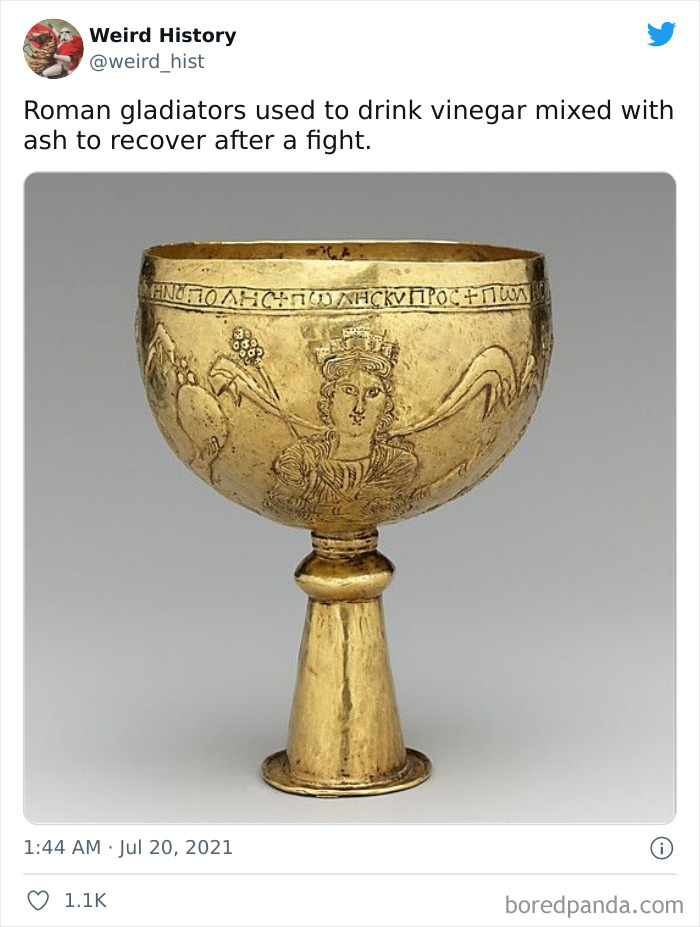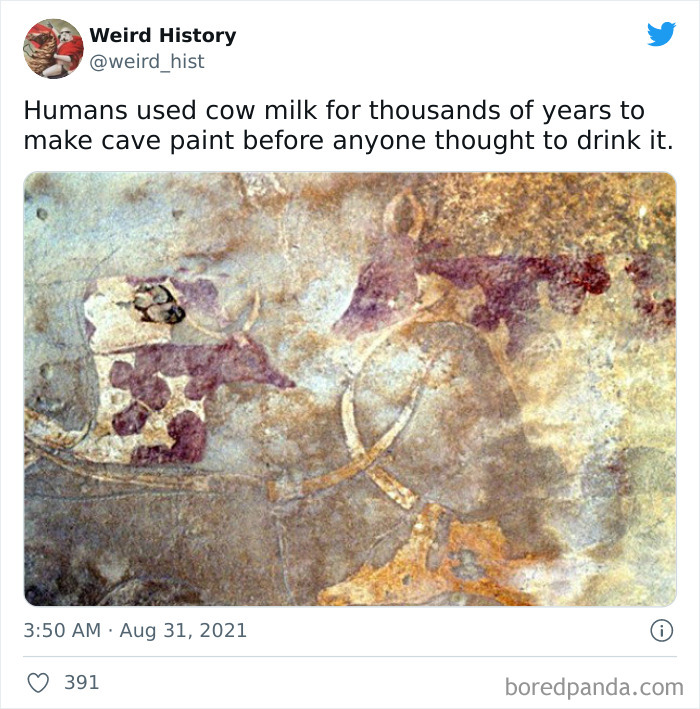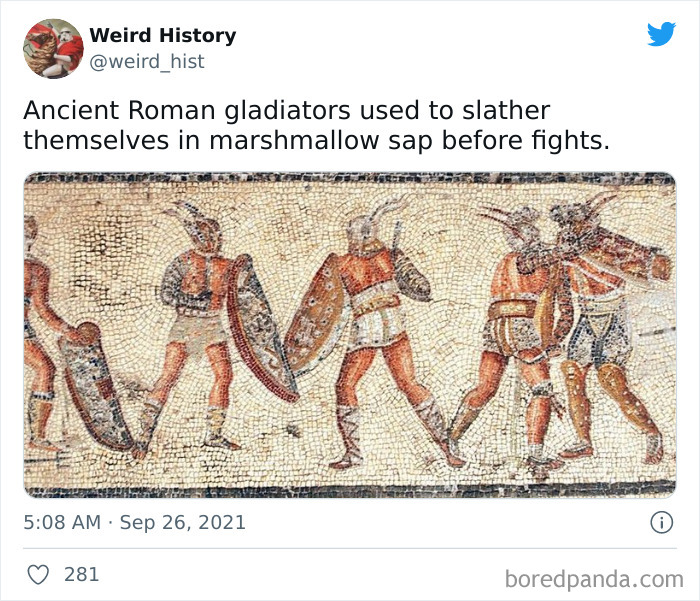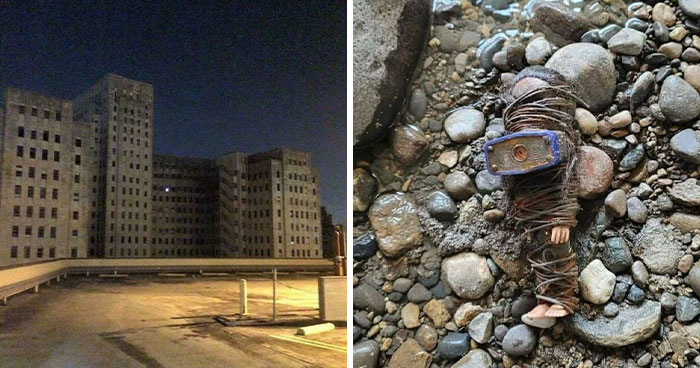
107 ‘Weird History’ Facts That History And Trivia Lovers Might Find Interesting (New Pics)
If it ain’t weird, interesting, and enlightening, it ain’t got any place on the Weird History Twitter page. Home to nearly 177k adoring fans, the Weird History project embodies the best aspects of education in the digital age: make it short, make it precise, and make it fun. Throw in some spot-on illustrations and boom! You’ve made yourself popular with fact-lovers all over the globe.
Created by Andrew Rader way back in September 2011, Weird History has been going strong ever since for more than a decade. There’s always a new fact, a new tidbit of trivia to hook your interest and keep you learning. Scroll down and enjoy the best post from Weird History. Don’t forget to upvote the facts you enjoyed learning the most and be sure to give the project a follow on your fave social media (it’s on almost all of them).
Meanwhile, I reached out to Lenore Skenazy, the president of Let Grow and the founder of the Free-Range Kids movement to learn about how parents can help encourage their kids to learn new things and develop fresh interests, whether historical or otherwise, without smothering them or putting undue pressure on them. You’ll find Bored Panda's interview about the importance of stepping back avoiding the urge to control everything as you scroll down.
Pssst, Pandas, over here! We know how much you enjoy learning new facts, especially all the cool history trivia that Weird History has to offer. After you’re done absorbing all the knowledge in this list, you should definitely check out Bored Panda’s previous features about ‘Weird History’ right over here: Part 1, Part 2, and Part 3.
More info: Twitter (Weird History) | Twitter (Andrew) | Instagram | Facebook | YouTube | Andrew-Rader.com
This post may include affiliate links.
Finding Light in Darkness
Trailblazing Wings
Quite a few lost their lives doing this - deserve the highest respect!
From Betrayal to Cat Haven
MIT-credentialed scientist Andrew, the founder and curator of Weird History, is larger than life. Originally from Ottawa in Canada, he’s an author, game designer, podcast host, and SpaceX Mission Manager, living in Los Angeles in California. It’s amazing that so much awesomeness fits inside a single person.
Frankly, he’s an inspiration and walking, talking proof that you really can achieve your dreams if you’re dedicated, persistent, and focused. The fact that he has enough time in his day to curate the Weird History Twitter page, picking out the very best facts to share online, is just the icing on the cake.
Pet Identity Crisis
The first Oscar was supposed to go to a dog. Rin Tin Tin received the most votes for best actor. The Academy held another voting round with humans only. They decided that giving a dog the first Oscar would give the wrong impression. They gave it to a future Nazi filmmaker instead.
Vintage Selfie Vibes
There are self portraits by artists from the 16th century doing exactly this. Painting themselves while looking into a mirror. Albrecht Dürer did one of himself in the nude even.
Medieval Multitasking Weapon
Child independence expert and author Lenore explained to Bored Panda that it is vital that parents take a step back and don’t overwhelm their kids with pressure the moment they start developing new interests. Patience and room to grow are incredibly important at moments like this.
“When a child develops a new interest, it can be tempting to say, ‘You like playing with clay? Great! I’ll enroll you in a ceramics class, and I’ll take you to the museum so you can study the sculptures, and we’ll arrange for you to go to Clay Camp this summer and…” she said how some parents start thinking and behaving when their kids start to develop a new interest. Whether it’s history or science, art or football.
“Stop. Breathe. Take a step back,” Lenore said that parents need to learn to slow down for their children’s sake. Similarly, if your kids take a sudden interest in history, the last thing that parents should do is immediately bombard them with books upon books, and sign them up to an after-school history club. Be patient, take a step back, don't overwhelm your kids.
Oldest Face On Film
Vanishing Words, Living Echoes
But he couldn't get any aspirin - because the parrots-etamol! Ok I'll see myself out
Manual Mastery at Work
According to Lenore, there’s a need for parents to find the difference between encouragement and control. “It’s great to encourage a child’s interests, but that doesn’t mean taking over. In other words, if a child likes playing with clay—lovely. Try to keep some clay around. If it turns into a deeper interest and they want to take a class or whatever, you can look into these.”
However, the expert noted that when parents and teachers start controlling every aspect of the kids’ interests, well, there’s hardly any interest left after that. “By putting an adult in charge of the activity—‘Today in ceramics class, children, we will be making a dog’—a child might actually end up a little LESS interested because now it’s not their thing anymore,” she warned.
Medieval Metal Vibes
Trailblazer Above the Clouds
The Day After Dryness
Lenore, the founder of Let Grow and the Free-Range Kids movement, shared with Bored Panda that there are different kinds of motivation: intrinsic and extrinsic. “Intrinsic motivation is when you want to do something. Extrinsic motivation is when someone ELSE wants you to do something.” It’s vital to allow children to develop their own intrinsic motivation without others constantly crowding in around them, throughout the day. When kids are left to their own devices, they can determine who they are through what they’re actually interested in.
Vintage Wheels Still Rolling
Tea Time With Gnomes
Tangled Tech Tales
“Kids have plenty of extrinsic motivation all day at school. Even in classes they like, someone else is telling them what to do and how to do it. So some free time when they’re allowed to do something just for the pleasure of it— not a grade, not a trophy— allows them to discover what they really enjoy and, in a way, who they truly are,” Lenore said.
“Our free Let Grow Independence Kit helps kids figure out some new things to try on their own, and helps adults let them!” she added.
Stairway Through Time
When a brothel in Pompeii was uncovered, the archaeologists came across rather explicit images and graffiti. Some of the graffiti was: "Thrust slowly", "Euplia was here... with two thousand beautiful men" and list prices: "Euplia sucks for five asses" (which is a currency name).
Foldable Vintage Maps
History’s First Street Blockade
A while back, I spoke about learning to separate facts from fiction with Joseph M. Pierre, a professor of psychiatry from the David Geffen School of Medicine at UCLA. He told Bored Panda that most conspiracy theories in recent history ”have been fairly inconsequential without any largescale behavioral ramifications.” Theories about what happened to JFK and Princess Diana, 9/11 and Flat Earth conspiracies haven’t affected the real world. With one exception—climate change conspiracies.
When Team Spirit Goes Up in Smoke
Color Code Confusion
Pink was considered the "little red", red was associated with soldiers and war. Blue on the other hand is considered the colour of the Virgin Mary. Makes you wonder how and why these colours were swapped.
Double Identities Approved
I knew this (from simpsons: "I am also Scotty"), but have not seen a picture of Mr Nimoy in Spock costume smiling until today. Mind blown (edit: I love his smile!)
“Not all of the debate around that topic involves a conspiracy theory. In fact, the most conspiratorial claim about climate change may be that ‘big oil’ companies, like ‘big tobacco’ decades before, know that climate change is real and is caused by human CO2 production, but that they’re purposely claiming otherwise and putting out misinformation to the contrary that refutes what the vast majority of climate change scientists have stated in order to protect profits from the industry,” the professor told Bored Panda.
Loud and Clear
Feathered Fighter Flair
Mullet: Fashion Rebel Cut
“Those of us who believe that conspiracy theory (remembering that some conspiracy theories are true!) argue that real-life physical actions—more so on the part of industry than individuals per se—are necessary now,” he said that the time to fight back against climate change is better sooner than later.
From Latin to Magic Words
High Above the Flock
Victorian Cycle Myths
Every new invention or method of gaining independence is "bad for women" 🙄
“Determining if someone is lying isn’t easy and is complicated by the fact that we don’t really have clear agreement of what it means to ‘believe’ something, much less genuinely,” the professor said that it’s very difficult to establish whether someone truly believes a conspiracy theory that they tout or if they’re incredibly good at pretending.
Baboon Bounty Hunters
Pottery Punishment Plans
Battle-Ready Bling
So, Pandas, which Weird History facts got stuck in your heads? Were there any bits of trivia that you already knew? Are there any facts that you’d just looove to share with your friends? Share your thoughts (and any other cool history facts that you know!) in the comment section at the bottom of the article. We can’t wait to hear what you think!
Ancient Peaks, Modern Views
Ancient Axe, Modern Cool
One-Wheel Wonder
Tusks With A Twist
Elders Assemble
First Pets with Attitude
Catwalk Casting Call
I've never seen this many cats on a leash. let alone this many cats on a leash who weren't on their side dramatically protesting.
Etymology Unleashed
Step Back In Time
Contours Without Coordinates
Weighty Solutions
This guy was a genius! He also was a hoot! Apparently at a dinner a woman said if she was married to him she'd poison his tea. He responded If I was married to you I'd drink it!
Not Your Average Wingman
Long Before Memes
"United States servicemen would draw the picture and the text 'Kilroy was here' on the walls and other places where they were stationed, encamped, or visited. An ad in Life magazine noted that WWII-era servicemen were fond of claiming that "whatever beach-head they stormed, they always found notices chalked up ahead of them, that 'Kilroy was here'" (Wikipedia) This is the same story my grandfather used to tell.
Juggling Dangerously Skilled
Before Columbus, There Were Vikings
No longer accurate. Tree ring data measuring a cosmic ray blast recently pinned their arrival down to exactly 1,000 years ago, in 1021 CE.
Balanced on the Edge
See Also:
Retro Deals and Real Deals
I have to express some skepticism here... 1) What likely counts as the very first legitimate online transaction goes to Dan Kohn in August 1994, who creating a website called NetMarket, the Shopify video reports. On August 11, Kohn sold a CD of Sting’s "Ten Summoner’s Tales" to a friend in Philadelphia, writes Peter H. Lewis wrote for The New York Times. 2) However, this (cannabis) exchange doesn’t check all the boxes for e-commerce: it was illegal and money wasn’t transferred online. Instead, the event probably represents the first deal facilitated by the internet.
Military Mischief Uncovered
A lot of these unusual drops are symbolic. Maybe it is meant as a message to the enemy that you are tired of taking shít from them... I seem to remember In WW II, there was a huge fake airport built out of wood by the German military in the occupied Netherlands as a decoy. British airforce, having known this from the beginning, bombed it with a single wooden bomb dummy with the words "Wood for Wood" on the hull.
Blueprints and Big Dreams
The working title for the project was "Pylone de 300 mètres de hauteur" - Pylon with a height of 300 meters :)
Timeless Giants
Old School Cooking Vibes
When Silence Speaks Volumes
Smart Paychecks, Smarter Economy
In the US Congress is allowed to use information they learn at work (even when the public doesn't have access to it) to buy and sell stocks and commodity futures. So yeah, pretty much just a corrupt version of the same thing.
Clouds With A View
I really want to go there now! I love Greek Mythology and have a TON of the stories memorized! I'm happy stimming right now! (I'm autistic)
Ancient Workout Realness
Vintage Grit And Glory
Tools of the Trade Back Then
Welding History’s Hidden Heroes
Battlefield Prank Chemistry
Statues Facing Courtroom Drama
I hope she won that case. It's simple to prove she's completely armless........... I'll show myself out.
History’s Ultimate Ouch
Viking Stereotype Central
I like how Baltic states are labeled "crazy relatives"; still part of the family
Midnight Pizza Run
Lasting Fallout Vibes
Speed Limits Without Tickets
Goat’s World Tour Was Wild
Literary Love Story
Brain Slices On Display
Origin Story Remix
Star Wars, But Different
Royal Rules Get Weird
Stone-Castle Endurance
When Armor Wins
The large metal scabs that came of the inside of that would still have made a nasty mess of the crew. That's how modern HESH rounds work. They don't penetrate they blow off big molten scabs armour on the inside of the tank that whiz around like misshapen bullets killing the crew. Nasty
Old School Rowing Vibes
Burning Cash, Literally
Almost Flying Machine
Looks very dangerous - does not seem to have much height to signal anything!
Stone Age Rent Agreement
Artillery Experts At Work
Auxiliary Territorial Service (ATS) plotters at work at Coastal Artillery Headquarters in Dover, December 1942 figuring the range points along the Kent coast in case of invasion.
History’s Peekaboo Moment
When I visited Versailles, I was blown away by the Hall of Mirrors and what had happened there...
Horseless But Not Heartless
Timeless Ink and Revisions
Cutting It Close
Cold Feet Solutions
Stripe Hype from History
Vintage Cool Crew
Retro Road Warriors
Where I live in Azerbaijan, we have old ladies who sweep the streets with brooms made out of sticks and twigs. And the driving here is insane. I hope they would be able to get them proper education and get machines to clean the streets.
Ancient Hangover Fixes
So Much For That Flight
Milk Before Cereal Days
Future Past Fantasies
Think Outside the Clock
Forgotten Fleets of History
Sadly the city council decided it had to be cleaned up around 10 years ago.
Sharp Reminders at Work
He kept a metal model of a porcupine on his desk starting in 1909. The figure was a memento of Freud's trip to the USA in 1909 with Jung and Ferenczi, thought to have been given to Freud by James Putnam. It was apparently a joke amongst them that Freud went to America only to see a wild porcupine and just incidentally give some lectures on psychoanalysis. Although it was previously thought to have been American-made, recent research indicates it was probably made in the Franz Bergman factory in Vienna, very likely by the artist Karl Fuhrmann. This means that Freud’s colleagues took it with them to New York to present it to him there. Freud travelled to the USA just once. In 1909, along with Carl Jung and Sandor Ferenczi, Freud journeyed to New York and on to Worcester, Massachusetts, to deliver the Clark Lectures: the first lectures on psychoanalysis in America. He visited the US once, calling it a "big mistake."
Last Horn Standing
It was not a trophy, but a gift from a voyevod of Rawa. It was stolen during Swedish invasion on Poland and never returned - now the property of Livrustkammaren in Stockholm
Desert Breakfast Hacks
Redefining Action Hero Fan Club
Cheapest Canal Crossing Ever
Gear Up for History
Stripes in Disguise
Fun fact: During WWI more than 130,000 Australian horses were sent overseas to support Australia's war effort. The horse that was most favoured was a mixed breed known as a waler, because many had been bred in New South Wales. Some of the thousands of Australian horses sent overseas in WWI were used by the Light Horse Brigade, others for transport - moving men, supplies and artillery. Walers are especially useful in desert country. In the more open country in the Sinai and Palestine where the light horse operated, horses formed the spearhead of the advancing armies so there were vast numbers of British and Indian and Australian and New Zealand cavalrymen employed in the Middle East.
Cartography with Heart
Emperor With a Brand Name
Blowing History Up
"The rape and desecration of an ancient Lakota holy mountain called the "Six Grandfathers" was mostly carved with dynamite." TIFIFY. mount-rush...bdfdc2.jpg 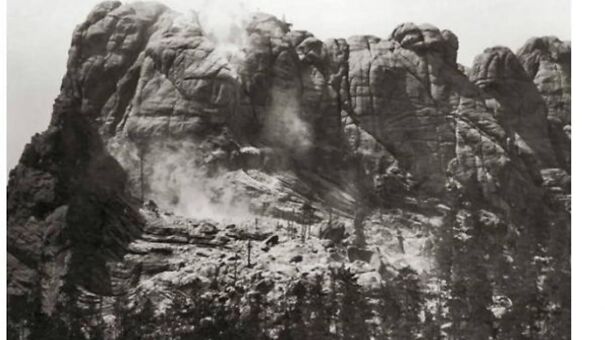
Silent Film Splurges
Father Of Atoms Flexing
Almost Capitol Perfect
Wings Over Kickoff
Sticky Situations Ahead
Yeah the whole garden gnome thing wasn't correct. Rich people a long time ago had Garden Hermits, basically an old person who dressed like a druid and lived in their garden. Garden Gnomes came from that because people couldn't afford to hire a Garden Hermit but they still wanted status, so Garden Gnomes became a thing so people could have their own garden hermits. I got sucked into a side quest on Google and wound up in Garden Druid land. It was an interesting adventure.
Do people still want garden hermits? I will gladly be one
Load More Replies...Yeah the whole garden gnome thing wasn't correct. Rich people a long time ago had Garden Hermits, basically an old person who dressed like a druid and lived in their garden. Garden Gnomes came from that because people couldn't afford to hire a Garden Hermit but they still wanted status, so Garden Gnomes became a thing so people could have their own garden hermits. I got sucked into a side quest on Google and wound up in Garden Druid land. It was an interesting adventure.
Do people still want garden hermits? I will gladly be one
Load More Replies...
 Dark Mode
Dark Mode 

 No fees, cancel anytime
No fees, cancel anytime 


























